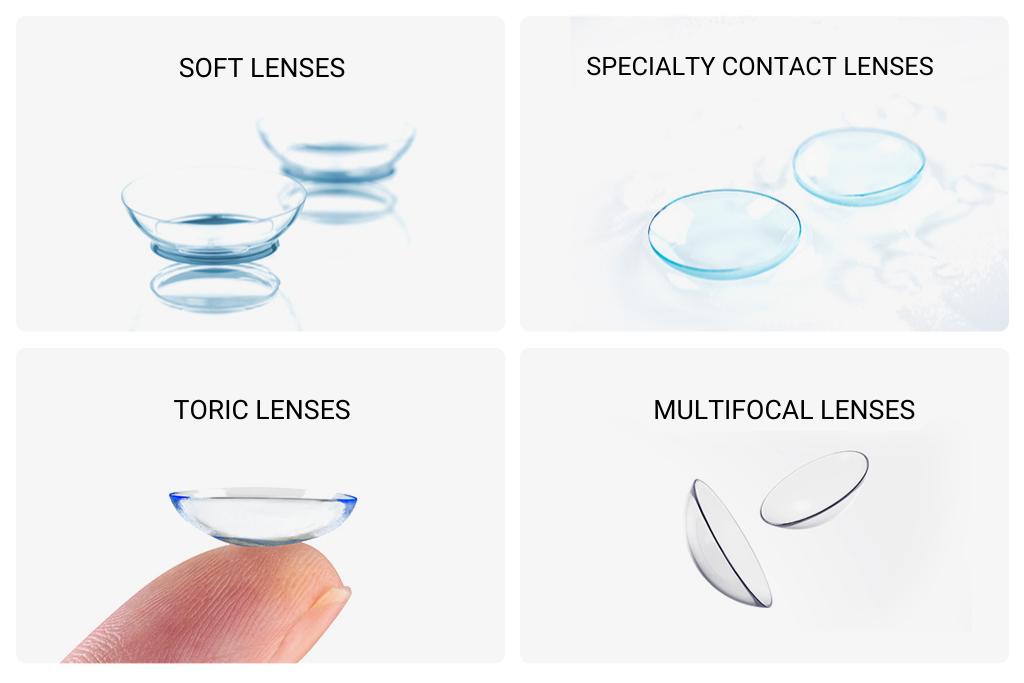
Every patient is different and so are their eyes. This means that there need to be different types of contact lenses to suit each individual. Most people are able to achieve excellent vision and comfort with soft, disposable contact lenses. Replacement schedules may vary, but typically, daily disposable contact lenses offer the greatest comfort and lowest risk of adverse side effects.
Soft Lenses
Soft contact lenses are a popular and convenient vision correction option made from flexible plastics that allow oxygen to pass through to the cornea. They are known for their comfort and ease of adaptation, making them suitable for a wide range of users, including those with astigmatism and presbyopia. Available in various types, such as daily disposables, bi-weekly, and monthly lenses, they offer flexibility and convenience for different lifestyles. Soft contact lenses provide clear vision without the bulk of glasses and are ideal for active individuals. Proper hygiene and regular replacement are crucial to maintain eye health and prevent infections.
Toric Lenses
Toric contact lenses are recommended for patients who have a refractive eye problem called astigmatism. Patients with astigmatism have corneal abnormalities that cause the refraction of the eye to be different between the vertical and horizontal planes, causing blurred vision and difficulty seeing fine details. Toric contact lenses are shaped in a particular way that creates the different focusing powers needed in each part of the lens to correct your vision. For this reason, Toric lenses must be placed into the eyes in the correct position.
Multifocal Contact Lenses
Multifocal contact lenses are specialized lenses designed to correct presbyopia, a condition that typically occurs as you age, making it difficult to focus on near objects. Unlike traditional single-vision lenses that correct either near or distance vision, multifocal contact lenses incorporate multiple prescriptions into a single lens. This innovative design allows you to enjoy clear vision at various distances, eliminating the need for separate reading glasses or bifocals.
Some patients have corneal abnormalities which mean that conventional lenses won’t sit comfortably on the surface of their eyes or allow for clear vision due to the irregularity of the corneal surface. In this case, specialty contact lenses may be recommended for optimal vision and comfort.
Who might be a good patient for specialty contact lenses?
Some of the patients that might benefit from specialty contact lenses include those who:
have been diagnosed with dry eye syndrome
have corneal scarring
have been diagnosed with keratoconus, a condition characterized by the bulging of the cornea
suffer from strabismus, a condition where the patient has an eye that turns in or out relative to the other
have suffered an injury to the eye
suffer from a peripheral corneal thinning disorder
are intolerant to other types of lenses
Your eye doctor or contact lens provider will be able to tell you if you need specialty contact lenses and if so, which lenses would be best based on your individual requirements.

Rigid Gas-Permeable Lenses
Also known as RGP lenses, these are made from a special material that is more rigid than soft lenses, allowing for a smooth corneal surface that maintains its shape, unlike a soft contact lens that “drapes” over the cornea. RGPs can be useful in some cases of corneal irregularity.
Scleral Contact Lenses
Scleral contact lenses are also made of a more rigid material and are much larger in diameter than RGPs. This size difference means that the edges of the contact lens fall on a white part of the eye, called the sclera rather than the cornea. Scleral lenses are also different in that they vault over the surface of the cornea rather than touching it, leaving a space between the front surface of the eye and the back of the contact lens. This makes scleral lenses a good choice for patients with dry eyes or corneal abnormalities like keratoconus.
For more information about specialty contact lenses, don’t hesitate to speak to our dedicated eye care team.






